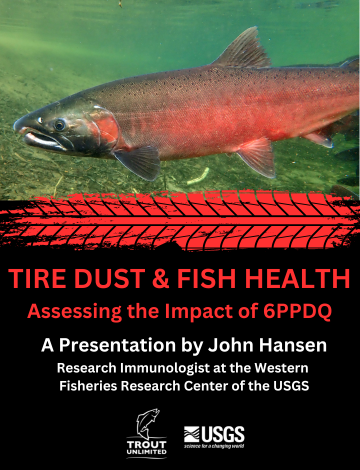
Tire Dust & Fish Health: Assessing the Impact of 6PPDQ
Join TU and our partners at the USGS for an informative update on the efforts to address 6PPDQ
Wed, May 22, 2024 11:00 AM (PDT)
After you purchase tickets you'll get instructions and a link to attend the event online.
Questions?
Contact Event Host
Details
This event ended
Wed, May 22 - 12:00 PM
Please join TU and our partners at USGS for an important science webinar on 6PPDQ.
The ubiquitous distribution and acute toxicity of 6PPDQ, used as a basic ingredient of auto tires, is a rapidly emerging topic of huge importance for the conservation of salmon and trout, as emphasized in the latest TROUT magazine. We are lucky to have Dr. Hansen as our next speaker to talk about USGS’s work on 6PPDQ as TU explores how we can engage meaningfully on this issue across the nation.
The ubiquitous distribution and acute toxicity of 6PPDQ, used as a basic ingredient of auto tires, is a rapidly emerging topic of huge importance for the conservation of salmon and trout, as emphasized in the latest TROUT magazine. We are lucky to have Dr. Hansen as our next speaker to talk about USGS’s work on 6PPDQ as TU explores how we can engage meaningfully on this issue across the nation.
Summary: For more than 25 years, stormwater runoff has been implicated as a causative factor leading to pre-spawn mortality for coho salmon in the Pacific Northwest. In 2021, academic and federal researchers using high-resolution mass spectroscopy discovered that a single chemical found in urban stormwater runoff can kill juvenile coho salmon at environmentally measurable levels. The chemical in question is 6PPD-quinone (6PPDQ), a transformation product of 6PPD that is used as an anti-degradant for vehicle tires. Other members of the Salmonidae family are also sensitive to 6PPDQ thus raising additional concerns for aquatic animal health. The USGS has been actively involved in assessing the transport and distribution of 6PPDQ, species sensitivity, and potential modes of action for toxicity. This presentation will provide an overview on 6PPDQ and how the USGS is involved in solving the problem of 6PPDQ mediated toxicity.
John Hansen is a Research Immunologist at the Western Fisheries Research Center in Seattle. His group looks at factors governing host-pathogen interactions in the aquatic environment as well as how environmental stressors affect fish health as part of the USGS EMA Biological Threats and Environmental Health Programs.
Loading...
Loading...
No fundraising information was found.
{{ campaign.name }}
Visit fundraiser page to
{{ campaign.ctaLabel.toLowerCase() }}
Loading...
Loading...
No performances assigned to this
track.
{{ performance.title }}
{{ performance.startDateDisp }} -
{{ performance.endDateHH }} {{ performance.endDateMM }} {{ performance.endDateAMPM }}
{{ performance.description }}
After you purchase tickets you'll get instructions and a link to
attend the event online.
Location
After you purchase tickets you'll get instructions and a link to
attend the event online.